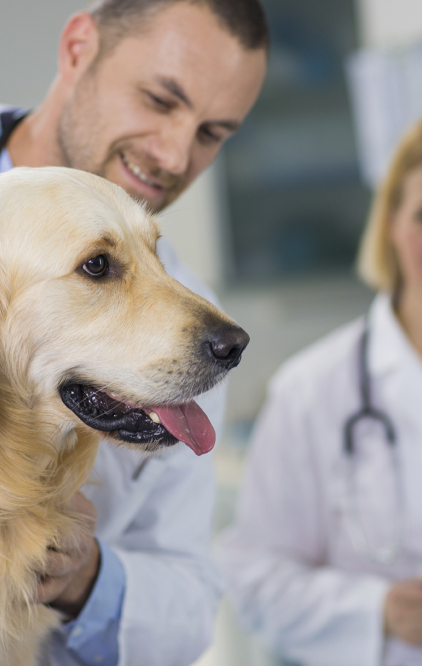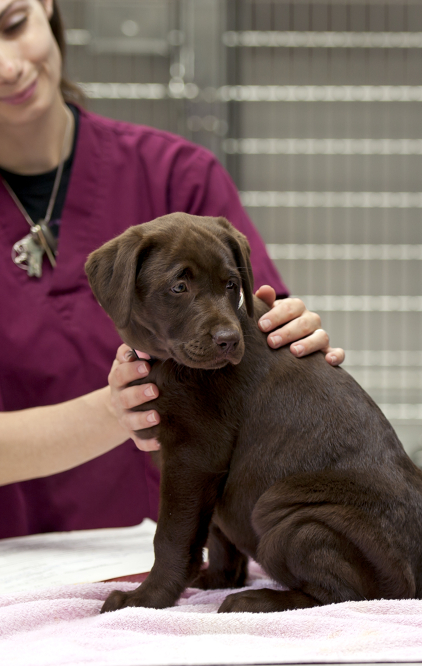If you have a desire to care for and treat animals, the Veterinary Technology program at Dallas College offers courses both on site and via distance education so you can study in the way that’s most convenient for you.
Veterinary Technology at a Glance
4-8 months to complete1
$594-$2,795 tuition2
- Cedar Valley3
2 years to complete1
$5,940 tuition2
- Cedar Valley3
What Can I Study?
I Want to Go to Work
Dallas College offers fast, flexible credentials designed with local employers to help you quickly start or advance your career.
-
Workforce Certificates
- CEU Small Animal Assistant Certificate $5,580 6 months
- Veterinary Assistant (ed2go) $2,795 6 months
-
Credit Certificates
- Equine Clinical Skills Enhanced Skills Certificate $594 4 months
- Veterinary Assisting Certificate $1,980 8 months
Can I Get a Job?
Dallas College offers a variety of certificates and degrees to help you gain the skills you need to start working right away.
- These credentials are often considered Career and Technical Education (CTE).
- These credentials are established with the assistance and cooperation of representatives from local business, to meet local and regional employment needs.
- Higher level certificates and degrees will typically lead to a higher salary in the workforce.
- Workforce (CE) Certificates can often be completed faster than traditional credit certificates but typically do not offer college credit.
- Level 1, Level 2, Enhanced Skills certificates and others, offer college credit and are often stackable to help you build skills as you work towards an Associate Degree.
- Workforce credentials may give you college credit at Dallas College, but they may not transfer to other colleges or universities.
If you're unsure if this is the right path for you, you can talk to a Pathway Specialist for advice.
Pathway Specialist
- 972-669-6400
- AskSOHS@DallasCollege.edu
What Can I Earn? Will There Be Plenty of Jobs?
Get the skills and knowledge to provide health care care to animals, educate people about animal care and more as a veterinary technician. Check out a few of the incredible career opportunities you’ll be ready for. Your future starts here!

Veterinary Assistants and Laboratory Animal Caretakers
$16/hr
Median Salary
525
Job Openings
+28%
Projected Outlook
Top Skills:
- Active Listening
- Critical Thinking
- Writing
- Reading Comprehension
- Service Orientation
- Monitoring
- Coordination
- Social Perceptiveness
- Speaking
- Time Management

Veterinary Technologists and Technicians
$18/hr
Median Salary
585
Job Openings
+21%
Projected Outlook
Top Skills:
- Critical Thinking
- Active Listening
- Reading Comprehension
- Speaking
- Monitoring
- Complex Problem Solving
- Writing
- Judgment and Decision Making
- Coordination
- Active Learning
All jobs data gathered for Dallas/Fort Worth. Source: Dallas College Labor Market Intelligence and Lightcast4.
“I do medical work with the animals, equivalent to the job of nursing in human hospitals. I love being able to apply what I learned in school to my field. Cedar Valley’s Vet Tech program prepares you to work, and I use my education from there every day on the job.” Read Kyndale Chamberlain's story.

A Look Inside the Veterinary Technology Program
Do you have a desire to care for and treat animals?
If so, the Veterinary Technology program at Dallas College is for you.
As a veterinary technician, your job might include cleaning and sterilizing equipment, preparing animals for and assisting during surgeries, performing lab tests, and preparing vaccines and serums.
Veterinary technicians can work as part of a team at private clinics, large-scale ranching operations, zoos, and teaching programs.
So why choose Dallas College? Dallas College offers courses both on-site and via distance education with our dedicated faculty who care about student success.
So you can study in the way that's most convenient for you.
Classes include a significant amount of hands-on learning, with college-owned animals.
You'll practice on equipment you will encounter later in your career as a veterinary technician. You can even earn certificates for small and large animal assisting. For more information, visit our website and begin your Dallas College experience.
The Veterinary Technology program offers an on-campus program and a distance education program to suit your needs. For more information about either program, visit the School of Health Sciences Information Packets and Sessions page to view the Veterinary Technology information packets.
Distance Education Program (DEVTP)
Our distance education Veterinary Technology program features:
- Specialized general education requirements, with courses such as speech and math that are designed to apply to veterinary medicine.
- Core content that focuses on an advanced education in pharmacy and pharmacology; surgical preparation and assistance; animal nursing; radiology and ultrasound; and laboratory and examination procedures.
- Multimedia courses that combine textbooks, videos, online assignments and in-clinic exercises.
- Flexible scheduling designed specifically for working adults — no commuting or altering your work and family lives to accommodate class schedules
- Optimal student-teacher contact — professors are available via phone or email for questions and support
Coordinating Your Coursework with a Designated Preceptor
Each hospital or clinic with a DEVTP student-employee is required to provide a designated preceptor who acts as an in-house mentor to assist, tutor and provide feedback to students.
- Preceptors are responsible for verifying that students have completed exercises, assignments and examinations.
- Preceptors must be veterinarians, graduates of an AVMA-accredited Veterinary Technology program or credentialed technicians designated as RVT, LVT or CVT.
- Preceptors spend at least one to two hours per week assisting DEVTP students with coursework.
On-Site Program
The Vet Tech program operates a 32,000-square-foot teaching facility on the Cedar Valley campus that features a 170-acre stock farm with breeding herds for horses, cattle and goats.
The Veterinary Technology program has its own admissions process, timeline and requirements. Visit the School of Health Sciences Information Packets and Sessions page to view the Veterinary Technology information packets.
The Veterinary Technology program has been accredited by the American Veterinary Medical Association (AVMA) since 1978.

Veterinary Technician National Examination (VTNE) Pass Rates: Jan. 1, 2022 – Dec. 31, 2024
| Number of first-time candidates that have taken the VTNE | 206 |
| Three-year VTNE pass percentage | 64.6% |
The three-year pass percentage on VTNE is calculated as follows: X/Y * 100
Persons having questions, concerns or complaints regarding the use and/or care of animals in the Veterinary Technology program at Cedar Valley may file their concerns in one of several ways:
- By contacting the Institutional Animal Care and Use Committee (IACUC) Chair, Ekua White, at eowhite@dallascollege.edu or 972-860-5234.
- By contacting one of the Attending Veterinarians:
- Dr. Jean Eye (peye@dallascollege.edu; 972-860-8056).
- By sending a letter to the IACUC Chair, Institutional Veterinarian or Division Office at:
3030 N. Dallas Ave.
Lancaster, TX 75134
COMMENTS MAY BE MADE ANONYMOUSLY.
Find Out More About Veterinary Technology
Sign up to receive additional information about Veterinary Technology or call 972-669-6400.
School of Health Sciences
- 972-669-6400
- AskSOHS@DallasCollege.edu
Dallas College
- 972-669-6400
- Text College to 214-978-6457
- StudentHelp@DallasCollege.edu
1Length of time is based on catalog degree plans. Prerequisites may be required, which are not included in this estimate. For most programs, full-time student status is assumed, a minimum of 12 credit hours per semester.
2Cost is based on tuition rates for program hours for Dallas County residents. The price of most required learning materials (books, software, supplies, etc.) is included with the price of tuition. Visit our Paying for College site to learn more about cost, financial aid, scholarships and more.
3Each location offers a unique combination of certificate and degree options. Not all degree and certificate offerings are available for admission/start at all campuses every semester.
4A portion of Lightcast’s data comes from O*NET Online by the U.S. Department of Labor, Employment and Training Administration (USDOL/ETA). Used under the CC BY 4.0 license. O*NET® is a trademark of USDOL/ETA. Lightcast has modified all or some of this information. USDOL/ETA has not approved, endorsed, or tested these modifications.
HB1508 Notice
This program may lead to an occupational license for which a prior criminal history may make a student ineligible.
For more information, please visit DallasCollege.edu/hb1508.





